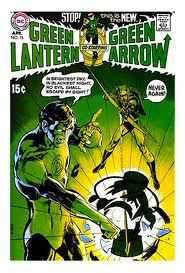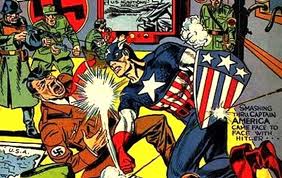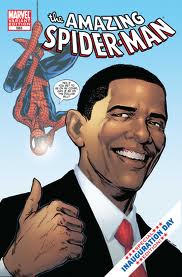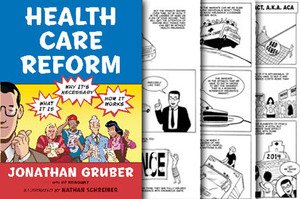
Many people argue that politics have no place in comics. For better or worse, politics have always been part of comics, as anyone who reads them can tell you. Sure, we have all seen the faces of political leaders staring back at us from those wretched Bluewater Productions comics, or shuddered upon seeing Steampunk Palinon the shelf at our LCS, or even seen Obama giving us the thumbs up from the cover of the Amazing Spider-man. Though I have never met anyone who has actually admitted to buying one of these comics (or even seen someone pick one up and thumb through it, much less purchase it), they still get published nonetheless.
Beyond the exploitation, comics are also being used to explain complex political situations and new laws. MacMillan published a graphic novel based off the 9/11 Report. Now the same publisher is releasing a comic book written by MIT economists Jonathan Grueber, titled Heath Care Reform: What It Is, Why It’s Necessary, How It Works. An excerpt from the full story about this project on NPR’s blog states the following:
“Gruber says he was eager to write a book on the federal law because he believes people don’t like the concept of the overhaul because they don’t understand what’s in it. He points to polling that shows the public endorsing individual aspects of the law.”
This is an interesting use of the medium to say the least, but not without precedent. Comics have always ha d a strong relationship to politics. As Upton Sinclair said in his Essay in Economic Interpretation Chapter 2: Who Owns the Artists? (1925) “All art is propaganda. It is universally and inescapably propaganda; sometimes unconsciously, but often deliberately, propaganda.” Since comics are art, created by artists, it is only natural that they too are subject to this theory.
d a strong relationship to politics. As Upton Sinclair said in his Essay in Economic Interpretation Chapter 2: Who Owns the Artists? (1925) “All art is propaganda. It is universally and inescapably propaganda; sometimes unconsciously, but often deliberately, propaganda.” Since comics are art, created by artists, it is only natural that they too are subject to this theory.
Don’t believe me? Comics have long been used for political commentary, parody, and satire. The examples of comic art as propaganda throughout the history of comics are too numerous to list in their entirety, so to illustrate my point I will just go through and cite a few random examples. Just in the last few months we have seen the comic industry react to the Occupy Protests in blogs, social networking posts, and probably the most apt example, the Occupy Comics project.
If not always propaganda, reverberations from national issues and debates almost always make their way into the pages of our beloved comic books. It is almost impossible to read Marvel’s Civil Warwithout seeing the personal liberties versus national safety debate that divided our nation reflected in the plot.
 Perhaps the most famous example of social issues impacting comics can be found in the revolutionary run of Neal Adams’ and Dennis O’Neil’s Green Lantern/Green Arrow title from the 70’s. By pairing the somewhat conservative Green Lantern with a liberal Green Arrow, not only was DC able to preserve and publish both characters, it provided a rich platform for the creators to explore such social issues as racism, drugs, the environment, and many more. This social consciousness was considered by fans and the comic book industry to be very innovative at the time, but not without people who still hate it to this day, and the title has spawned some of the most reprinted and iconic images and stories in comic history, but it certainly wasn’t the first.
Perhaps the most famous example of social issues impacting comics can be found in the revolutionary run of Neal Adams’ and Dennis O’Neil’s Green Lantern/Green Arrow title from the 70’s. By pairing the somewhat conservative Green Lantern with a liberal Green Arrow, not only was DC able to preserve and publish both characters, it provided a rich platform for the creators to explore such social issues as racism, drugs, the environment, and many more. This social consciousness was considered by fans and the comic book industry to be very innovative at the time, but not without people who still hate it to this day, and the title has spawned some of the most reprinted and iconic images and stories in comic history, but it certainly wasn’t the first.
 War comics have been around nearly since the birth of the comic industry, and here is where we really see politics and propaganda have an indisputable presence. The views in war comics cut both ways. During Vietnam we see many more comics that just seem like war stories, but scratch beneath the surface and many of these titles show the horrors of war, and are clearly speaking out against it. On the side of the debate, examples from the World Wars clearly have a very pro-war, super-patriot vibe. Take for example, Captain America? I love Cap, but he was clearly a form of pro-U.S. propaganda. The images of Captain America punching Hitler in the jaw and making his way through legions of Nazis clearly helped to reassure citizens with enlisted loved ones and subsisting on rations that the U.S. involvement in WWII was the right choice. Go back and check out some of the very racist and derogatory labels that are given to German and Japanese people in some of the titles from this era, in an effort to dehumanize our enemy and nip any anti-war backlash in the bud.
War comics have been around nearly since the birth of the comic industry, and here is where we really see politics and propaganda have an indisputable presence. The views in war comics cut both ways. During Vietnam we see many more comics that just seem like war stories, but scratch beneath the surface and many of these titles show the horrors of war, and are clearly speaking out against it. On the side of the debate, examples from the World Wars clearly have a very pro-war, super-patriot vibe. Take for example, Captain America? I love Cap, but he was clearly a form of pro-U.S. propaganda. The images of Captain America punching Hitler in the jaw and making his way through legions of Nazis clearly helped to reassure citizens with enlisted loved ones and subsisting on rations that the U.S. involvement in WWII was the right choice. Go back and check out some of the very racist and derogatory labels that are given to German and Japanese people in some of the titles from this era, in an effort to dehumanize our enemy and nip any anti-war backlash in the bud.
Perhaps one reason for the pro-war tone in comics from this era and for decades after is the fact that so many comic creators and readers served in the military. Even some biggest names in comics like Jack Kirby and Stan Lee served their country. Another reason for this tone could be that comics played a key role as a strategy to boost the morale of deployed troops during this era. Comic strips appeared in military base newspapers like Stars and Stripes. Comics like Sad Sack and Private Breger (which later changed its name to a title you would likely be familiar with – G.I. Joe), are a couple of examples of such titles. Many servicemen actually developed their taste for comics while in the service, and after they came home became part of the comic book readership.
 How WWII ended ushered in the nuclear age and all of the social issues that came with it, leading the world and comics into the Cold War era. Do we even need to discuss how the specter of nuclear annihilation would infiltrate all forms of media, comics included? Nuclear attack and radiation factor so heavily into comic plots and character origins, that they are still being used as story devices to this very day!
How WWII ended ushered in the nuclear age and all of the social issues that came with it, leading the world and comics into the Cold War era. Do we even need to discuss how the specter of nuclear annihilation would infiltrate all forms of media, comics included? Nuclear attack and radiation factor so heavily into comic plots and character origins, that they are still being used as story devices to this very day!
Most people trace mainstream comic’s roots to the pulp books of the 20’s. One often overlooked point is how much the history of comics, underground and independent comics especially, have in common with the rich tradition of pamphleteering. Many pamphlets throughout history have been, inexpensive, very political, and often relied on a fusion of words as well as images to convey revolutionary and incendiary ideas and concepts, often to illiterate populace’s. Underground and independent comics, especially during the 60’s, often expressed very counter-cultural ideas and were some of the lone voices in the comic book industry that did not portray civil rights, protesters, and the counter-culture movement in a negative and dismissive manner. Many of these ideas would have never been permitted in the mainstream press, and in this way I see underground comics as almost agitprop and having much in common with pamphleteering. Slowly many mainstream comics would come around and realize that people in the counter-culture read comics too.
So from these examples (that are just the tip of the iceberg — entire books could be written on this topic) we see that politics, social issues, and comics have always had a close relationship, and that a graphic novel about healthcare reform, while a novel concept (pun intended), is really not as outlandish and without precedent as it may seem. Will comics become the new vogue way of trying to explain complex political theories, social issues, and new laws to the masses; or is Heath Care Reform: What It Is, Why It’s Necessary, How It Works just another chapter in the long and fascinating history of comic books?

















This definitely proves the overwhelmingly left-wing bent of the comics industry in general. The healthcare reform graphic novel and fanatical support for Barack Obama is not unlike Riefenstahl's Triumph of the Will.
Great piece. When I see the art for Health Care Reform, I think they're mostly tackling it in this manner because it makes the information easy to digest. Similar to Scott McCloud and his Understanding Comics. He breaks down the industry so that the layman can see it for what it is.
When I think of comic publishers, until I researched this piece, MacMillan wasn't a name that came to mind. I associate them more with textbooks and the like. Comics are much like their creators, they hold a diverse array of viewpoints. Upon further research I found that there has actually been a book published on this very topic titled "Comic Art Propaganda: A Graphic History" by Fredrik Stromberg that I want to check out. I think the comparison of comics to pamphleteering is a unique persepctive.
Excellent job Robb. I've always been interested in the Fredric Wertham trials. No doubt scaremongering about comics supposedly leading to teen delinquency was an easy vote-catcher for some political opportunists – but it also demonstrates how comics were recognized as an influential medium.
At least, that's how I choose to look on it.
Well that gets Godwin's Law out of the way nice and early in the discussion.
If Obama and Hitler are left-wing, who would you say counts as right wing or centrist?
You should probably look up the work of Frank Miller, Mark Millar or any of the 'Political Power' series of comics before you tar the whole industry with the same metaphorical brush.
Great article Robb, you raise some really important points.
Much as you said when you linked comics to pamphleteering, the tradition of comics and cartooning here in Britain seems to be born out of satirical works that were openly political in the 18th and 19th centuries (the classic example of which would be Punch magazine).
In fact the most famous works of William Hogarth, the man widely credited as being Britain's greatest artist, were sequential satires, and I'd urge any readers here to take a look at the following: 'A Rake's Progress' 'The Humours of an Election' (http://en.wikipedia.org/wiki/Humours_of_an_Election) or 'The Four Stages of Cruelty' if at all possible.
Heh, I know I found the Riefenstahl reference hysterical. But I guess that's what you get for mentioning either of the 'P' words on an American site.
Of course whenever I hear of Triumph of the Will I flash to the final scene of Star Wars. Lucas' attempt to make 'art' transcend historical context.
Love your work Ed! 🙂
[…] Obama with Spiderman / Obama / Obama-style Iron Man / Obama Rorschach […]